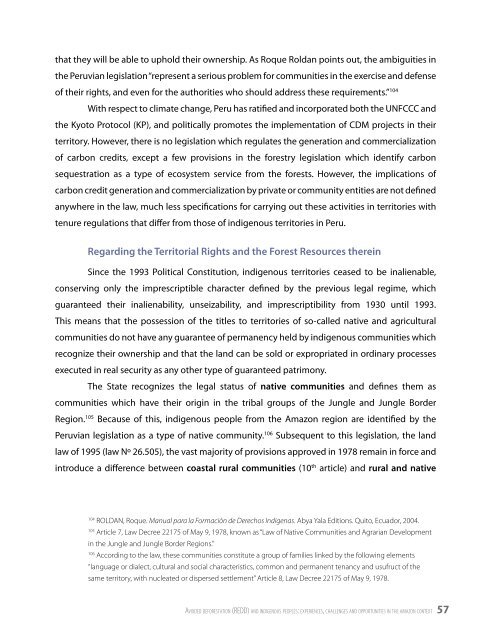Avoided Deforestation (REDD) and Indigenous ... - Amazon Fund
Avoided Deforestation (REDD) and Indigenous ... - Amazon Fund
Avoided Deforestation (REDD) and Indigenous ... - Amazon Fund
Create successful ePaper yourself
Turn your PDF publications into a flip-book with our unique Google optimized e-Paper software.
that they will be able to uphold their ownership. As Roque Roldan points out, the ambiguities in<br />
the Peruvian legislation “represent a serious problem for communities in the exercise <strong>and</strong> defense<br />
of their rights, <strong>and</strong> even for the authorities who should address these requirements.” 104<br />
With respect to climate change, Peru has ratified <strong>and</strong> incorporated both the UNFCCC <strong>and</strong><br />
the Kyoto Protocol (KP), <strong>and</strong> politically promotes the implementation of CDM projects in their<br />
territory. However, there is no legislation which regulates the generation <strong>and</strong> commercialization<br />
of carbon credits, except a few provisions in the forestry legislation which identify carbon<br />
sequestration as a type of ecosystem service from the forests. However, the implications of<br />
carbon credit generation <strong>and</strong> commercialization by private or community entities are not defined<br />
anywhere in the law, much less specifications for carrying out these activities in territories with<br />
tenure regulations that differ from those of indigenous territories in Peru.<br />
Regarding the Territorial Rights <strong>and</strong> the Forest Resources therein<br />
Since the 1993 Political Constitution, indigenous territories ceased to be inalienable,<br />
conserving only the imprescriptible character defined by the previous legal regime, which<br />
guaranteed their inalienability, unseizability, <strong>and</strong> imprescriptibility from 1930 until 1993.<br />
This means that the possession of the titles to territories of so-called native <strong>and</strong> agricultural<br />
communities do not have any guarantee of permanency held by indigenous communities which<br />
recognize their ownership <strong>and</strong> that the l<strong>and</strong> can be sold or expropriated in ordinary processes<br />
executed in real security as any other type of guaranteed patrimony.<br />
The State recognizes the legal status of native communities <strong>and</strong> defines them as<br />
communities which have their origin in the tribal groups of the Jungle <strong>and</strong> Jungle Border<br />
Region. 105 Because of this, indigenous people from the <strong>Amazon</strong> region are identified by the<br />
Peruvian legislation as a type of native community. 106 Subsequent to this legislation, the l<strong>and</strong><br />
law of 1995 (law Nº 26.505), the vast majority of provisions approved in 1978 remain in force <strong>and</strong><br />
introduce a difference between coastal rural communities (10th article) <strong>and</strong> rural <strong>and</strong> native<br />
104 ROLDAN, Roque. Manual para la Formación de Derechos Indigenas. Abya Yala Editions. Quito, Ecuador, 2004.<br />
105 Article 7, Law Decree 22175 of May 9, 1978, known as “Law of Native Communities <strong>and</strong> Agrarian Development<br />
in the Jungle <strong>and</strong> Jungle Border Regions.”<br />
106 According to the law, these communities constitute a group of families linked by the following elements<br />
“language or dialect, cultural <strong>and</strong> social characteristics, common <strong>and</strong> permanent tenancy <strong>and</strong> usufruct of the<br />
same territory, with nucleated or dispersed settlement” Article 8, Law Decree 22175 of May 9, 1978.<br />
Av o i d e d d e f o re s t A t i o n (redd) A n d i n d i g e n o u s p e o p l e s: experiences, chAllenges A n d o p p o r t u n i t i e s in t h e A m A zo n c o n t e x t 57
















